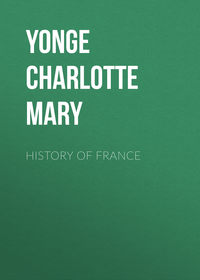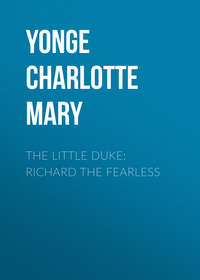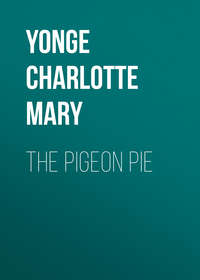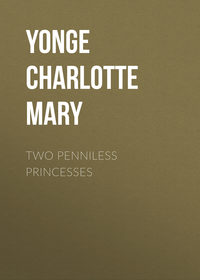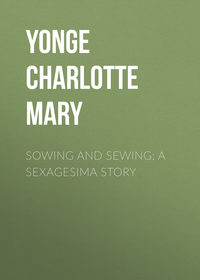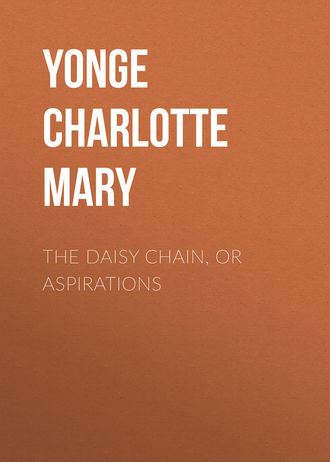
The Daisy Chain, or Aspirations
Ethel was much inclined to stay at home, but she did not know whether this was from heat or from idleness, and her fretted spirits took the turn of determination—so she posted off at a galloping pace, that her brothers called her “Cocksmoor speed,” and Mary panted by her side, humbly petitioning for the plantation path, when she answered “that it was as well to be hot in the sun as in the shade.”
The school-room was unusually full, all the haymaking mothers made it serve as an infant school, and though as much window was opened as there could be, the effect was not coolness. Nevertheless, Ethel sat down and gathered her class round her, and she had just heard the chapter once read, when there was a little confusion, a frightened cry of “Ethel!” and before she could rise to her feet—a flump upon the floor—poor Mary had absolutely fainted dead away.
Ethel was much terrified, and very angry with herself; Mary was no light weight, but Mrs. Elwood coming at their cry, helped Ethel to drag her into the outer room, where she soon began to recover, and to be excessively puzzled as to what had happened to her. She said the sea was roaring, and where was Harry? and then she looked much surprised to find herself lying on Mrs. Elwood’s damp flags—a circumstance extremely distressing to Mrs. Elwood, who wanted to carry her upstairs into Cherry’s room, very clean and very white, but with such a sun shining full into it!
Ethel lavished all care, and reproached herself greatly, though to be sure nothing had ever been supposed capable of hurting Mary, and Mary herself protested that nothing at all had ailed her till the children’s voices began to sound funny, and turned into the waves of the sea, and therewith poor Mary burst into a great flood of tears, and asked whether Harry would ever come back. The tears did her a great deal of good, though not so much as the being petted by Ethel, and she soon declared herself perfectly well; but Ethel could not think of letting her walk home, and sent off a boy—who she trusted would not faint—with a note to Margaret, desiring her to send the gig, which fortunately was at home to-day.
Mary had partaken of some of Mrs. Elwood’s tea, which, though extremely bitter, seemed a great cordial, and was sitting, quite revived, in the arbour at the door, when the gig stopped, and Dr. Spencer walked in.
“Well, and how are you?”
“Quite well now, thank you. Was Margaret frightened? Why did you come?”
“I thought it would make her happier, as your father was not at home. Here, let me feel your pulse. Do you think no one is a doctor but your papa? There’s not much the matter with you, however. Where is Ethel?”
“In the school,” and Mary opened the door. Dr. Spencer looked in, as Ethel came out, and his face put her in mind of Norman’s look.
“No wonder!” was all he said.
Ethel was soon satisfied that he did not think Mary ill. In fact, he said fainting was the most natural and justifiable measure, under the circumstances. “How many human creatures do you keep there?” he asked.
“Forty-seven to-day,” said Mary proudly.
“I shall indict you for cruelty to animals! I think I have known it hotter at Poonshedagore, but there we had punkahs!”
“It was very wrong of me,” said Ethel. “I should have thought of poor Mary, in that sunny walk, but Mary never complains.”
“Oh, never mind,” said Mary, “it did not hurt.”
“I’m not thinking of Mary,” said Dr. Spencer, “but of the wretched beings you are leaving shut up there. I wonder what the mercury would be there.”
“We cannot help it,” said Mary. “We cannot get the ground.”
And Mary, having been voted into the seat of honour and comfort by his side in the carriage, told her version of Cocksmoor and the Committee; while Ethel sat up in the little narrow seat behind, severely reproaching herself for her want of consideration towards one so good and patient as Mary, who proved to have been suffering far more on Harry’s account than they had guessed, and who was so simple and thorough-going in doing her duty. This was not being a good elder sister, and, when they came home, she confessed it, and showed so much remorse that poor Mary was quite shocked, and cried so bitterly that it was necessary to quit the subject.
“Ethel, dearest,” said Margaret that night, after they were in bed, “is there anything the matter?”
“No, nothing, but that Oxford has spoiled me,” said Ethel, resolutely. “I am very cross and selfish!”
“It will be better by-and-by,” said Margaret, “if only you are sure you have nothing to make you unhappy.”
“Nothing,” said Ethel. She was becoming too much ashamed of her fancy to breathe one word about it, and she had spoken the truth. Pleasure had spoiled her.
“If only we could do something for Cocksmoor!” she sighed, presently, “with that one hundred and fifty pounds lying idle.”
Margaret was very glad that her thoughts were taking this channel, but it was not a promising one, for there seemed to be nothing practicable, present or future. The ground could not be had—the pig would not get over the stile—the old woman could not get home to-night. Cocksmoor must put up with its present school, and Mary must not be walked to death.
Or, as Ethel drew her own moral, sacrifice must not be selfish. One great resolution that has been costly, must not blunt us in the daily details of life.
CHAPTER XI
If to do were as easy as to know what were good to do, Chapels had been Churches, and poor men’s cottages, princes’ palaces.MERCHANT OF VENICE.“Dick,” said Dr. Spencer, as the friends sat together in the evening, after Mary’s swoon, “you seem to have found an expedient for making havoc among your daughters.”
“It does not hurt them,” said Dr. May carelessly.
“Pretty well, after the specimen of to-day.”
“That was chance.”
“If you like it, I have no more to say; but I should like to make you sit for two hours in such a temperature. If they were mine—”
“Very fine talking, but I would not take the responsibility of hindering the only pains that have ever been taken with that unlucky place. You don’t know that girl Ethel. She began at fifteen, entirely of her own accord, and has never faltered. If any of the children there are saved from perdition, it is owing to her, and I am not going to be the man to stop her. They are strong, healthy girls, and I cannot see that it does them any harm—rather good.”
“Have you any special predilection for a room eight feet by nine?”
“Can’t be helped. What would you have said if you had seen the last?”
“What is this about one hundred and fifty pounds in hand?”
“The ladies here chose to have a fancy fair, the only result of which, hitherto, has been the taking away my Flora. There is the money, but the land can’t be had.”
“Why not?”
“Tied up between the Drydale Estate and – College, and in the hands of the quarry master, Nicolson. There was an application made to the College, but they did not begin at the right end.”
“Upon my word, Dick, you take it easy!” cried his friend, rather indignantly.
“I own I have not stirred in the matter,” said Dr. May. “I knew nothing would come to good under the pack of silly women that our schools are ridden with—” and, as he heard a sound a little like “pish!” he continued, “and that old Ramsden, it is absolutely useless to work with such a head—or no head. There’s nothing for it but to wait for better times, instead of setting up independent, insubordinate action.”
“You are the man to leave venerable abuses undisturbed!”
“The cure is worse than the disease!”
“There spoke the Corporation!”
“Ah! it was not the way you set to work in Poonshedagore.”
“Why, really, when the venerable abuses consisted of Hindoos praying to their own three-legged stools, and keeping sacred monkeys in honour of the ape Hanyuman, it was a question whether one could be a Christian oneself, and suffer it undisturbed. It was coming it too strong, when I was requested to lend my own step-ladder for the convenience of an exhibition of a devotee swinging on hooks in his sides.”
Dr. Spencer had, in fact, never rested till he had established a mission in his former remote station; and his brown godson, once a Brahmin, now an exemplary clergyman, traced his conversion to the friendship and example of the English physician.
“Well, I have lashed about me at abuses, in my time,” said Dr. May.
“I dare say you have, Dick!” and they both laughed—the inconsiderate way was so well delineated.
“Just so,” replied Dr. May; “and I made enemies enough to fetter me now. I do not mean that I have done right—I have not; but there is a good deal on my hands, and I don’t write easily. I have been slower to take up new matters than I ought to have been.”
“I see, I see!” said Dr. Spencer, rather sorry for his implied reproach, “but must Cocksmoor be left to its fate, and your gallant daughter to hers?”
“The vicar won’t stir. He is indolent enough by nature, and worse with gout; and I do not see what good I could do. I once offended the tenant, Nicolson, by fining him for cheating his unhappy labourers, on the abominable truck system; and he had rather poison me than do anything to oblige me. And, as to the copyholder, he is a fine gentleman, who never comes near the place, nor does anything for it.”
“Who is he?”
“Sir Henry Walkinghame.”
“Sir Henry Walkinghame! I know the man. I found him in one of the caves at Thebes, among the mummies, laid up with a fever, nearly ready to be a mummy himself! I remember bleeding him—irregular, was not it? but one does not stand on ceremony in Pharaoh’s tomb. I got him through with it; we came up the Nile together, and the last I saw of him was at Alexandria. He is your man! something might be done with him!”
“I believe Flora promises to ask him if she should ever meet him in London, but he is always away. If ever we should be happy enough to get an active incumbent, we shall have a chance.”
Two days after, Ethel came down equipped for Cocksmoor. It was as hot as ever, and Mary was ordered to stay at home, being somewhat pacified by a promise that she should go again as soon as the weather was fit for anything but a salamander.
Dr. Spencer was in the hall, with his bamboo, his great Panama hat, and gray loose coat, for he entirely avoided, except on Sundays, the medical suit of black. He offered to relieve Ethel of her bag of books.
“No thank you.” (He had them by this time). “But I am going to Cocksmoor.”
“Will you allow me to be your companion?”
“I shall be very glad of the pleasure of your company, but I am not in the least afraid of going alone,” said she, smiling, however, so as to show she was glad of such pleasant company. “I forewarn you though that I have business there.”
“I will find occupation.”
“And you must promise not to turn against me. I have undergone a great deal already about that place. Norman was always preaching against it, and now that he has become reasonable, I can’t have papa set against it again—besides, he would mind you more.”
Dr. Spencer promised to do nothing but what was quite reasonable. Ethel believed that he accompanied her merely because his gallantry would not suffer her to go unescorted, and she was not sorry, for it was too long a walk for solitude to be very agreeable, when strange wagoners might be on the road, though she had never let them be “lions in the path.”
The walk was as pleasant as a scorching sun would allow, and by the time they arrived at the scattered cottages, Ethel had been drawn into explaining many of her Cocksmoor perplexities.
“If you could get the land granted, where should you choose to have it?” he asked. “You know it will not do to go and say, ‘Be pleased to give me a piece of land,’ without specifying what, or you might chance to have one at the Land’s End.”
“I see, that was one of the blunders,” said Ethel. “But I had often thought of this nice little square place, between two gardens, and sheltered by the old quarry.”
“Ha! hardly space enough, I should say,” replied Dr. Spencer, stepping it out. “No, that won’t do, so confined by the quarry. Let us look farther.”
A surmise crossed Ethel. Could he be going to take the work on himself, but that was too wild a supposition—she knew he had nothing of his own, only a moderate pension from the East India Company.
“What do you think of this?” he said, coming to the slope of a knoll, commanding a pretty view of the Abbotstoke woods, clear from houses, and yet not remote from the hamlet. She agreed that it would do well, and he kicked up a bit of turf, and pryed into the soil, pronouncing it dry, and fit for a good foundation. Then he began to step it out, making a circuit that amazed her, but he said, “It is of no use to do it at twice. Your school can be only the first step towards a church, and you had better have room—enough at once. It will serve as an endowment in the meantime.”
He would not let her remain in the sun, and she went into school. She found him, when she came out, sitting in the arbour smoking a cigar-rather a shock to her feelings, though he threw it away the instant she appeared, and she excused him for his foreign habits.
In the evening, he brought down a traveller’s case of instruments, and proceeded to draw a beautiful little map of Cocksmoor, where it seemed that he had taken all his measurements, whilst she was in school. He ended by an imaginary plan and elevation for the school, with a pretty oriel window and bell-gable, that made Ethel sigh with delight at the bare idea.
Next day, he vanished after dinner, but this he often did; he used to say he must go and have a holiday of smoking—he could not bear too much civilised society. He came back for tea, however, and had not sat down long before he said, “Now, I know all about it. I shall pack up my goods, and be off for Vienna to-morrow.”
“To Vienna!” was the general and dolorous outcry, and Gertrude laid hold of him and said he should not go.
“I am coming back,” he said, “if you will have me. The college holds a court at Fordholm on the 3rd, and on the last of this month, I hope to return.”
“College! Court! What are you going to do at Vienna? Where have you left your senses?” asked Dr. May.
“I find Sir Henry Walkinghame is there. I have been on an exploring expedition to Drydale, found out his man of business, and where he is to be written to. The college holds a court at Fordholm, and I hope to have our business settled.”
Ethel was too much confounded to speak. Her father was exclaiming on the shortness of the time.
“Plenty of time,” said Dr. Spencer, demonstrating that he should be able to travel comfortably, and have four days to spare at Vienna—a journey which he seemed to think less of, than did Dr. May of going to London.
As to checking him, of that there was no possibility, nor, indeed, notion, though Ethel did not quite know how to believe in it, nor that the plan could come to good. Ethel was much better by this time: by her vigorous efforts, she had recovered her tone of mind and interest in what was passing; and though now and then Norman’s letters, carrying sentences of remembrance, made her glow a little, she was so steady to her resolution that she averted all traffic in messages through her brother’s correspondence, and, in that fear, allowed it to lapse into Margaret’s hands more than she had ever done. Indeed, no one greatly liked writing from home, it was heartless work to say always, “No news from the Alcestis” and yet they all declared they were not anxious.
Hector Ernescliffe knelt a great while beside Margaret’s sofa, on the first evening of his holidays, and there was a long low-voiced talk between them. Ethel wished that she had warned him off, for Margaret looked much more harassed and anxious, after having heard the outpouring of all that was on his mind.
Dr. Spencer thought her looking worse, when he came, as come he did, on the appointed day. He had brought Sir Henry Walkinghame’s full consent to the surrender of the land; drawn up in such form as could be acted upon, and a letter to his man of business. But Nicolson! He was a worse dragon nearer home, hating all schools, especially hating Dr. May.
However, said Dr. Spencer, in eastern form, “Have I encountered Rajahs, and smoked pipes with three-tailed Pachas, that I should dread the face of the father of quarrymen.”
What he did with the father of quarrymen was not known, whether he talked him over, or bought him off—Margaret hoped the former; Dr. May feared the latter; the results were certain; Mr. Nicolson had agreed that the land should be given up.
The triumphant Dr. Spencer sat down to write a statement to be shown to the college authorities, when they should come to hold their court.
“The land must be put into the hands of trustees,” he said. “The incumbent of course?”
“Then yourself; and we must have another. Your son-in-law?”
“You, I should think,” said Dr. May.
“I! Why, I am going.”
“Going, but not gone,” said his friend.
“I must go! I tell you, Dick; I must have a place of my own to smoke my pipe in.”
“Is that all?” said Dr. May. “I think you might be accommodated here, unless you wished to be near your sister.”
“My sister is always resorting to watering-places. My nieces do nothing but play on the piano. No, I shall perhaps go off to America, the only place I have not seen yet, and I more than half engaged to go and help at Poonshedagore.”
“Better order your coffin then,” muttered Dr. May.
“I shall try lodgings in London, near the old hospital, perhaps—and go and turn over the British Museum library.”
“Look you here, Spencer, I have a much better plan. Do you know that scrap of a house of mine, by the back gate, just big enough for you and your pipe? Set up your staff there. Ethel will never get her school built without you.”
“Oh! that would be capital!” cried Ethel.
“It would be the best speculation for me. You would pay rent, and the last old woman never did,” continued Dr. May. “A garden the length of this one—”
“But I say—I want to be near the British Museum.”
“Take a season-ticket, and run up once a week.”
“I shall teach your boys to smoke!”
“I’ll see to that!”
“You have given Cocksmoor one lift,” said Ethel, “and it will never go on without you.”
“It is such a nice house!” added the children, in chorus; “it would be such fun to have you there.”
“Daisy will never be able to spare her other doctor,” said Margaret, smiling.
“Run to Mrs. Adams, Tom, and get the key,” said Dr. May.
There was a putting on of hats and bonnets, and the whole party walked down the garden to inspect the house—a matter of curiosity to some—for it was where the old lady had resided on whom Harry had played so many tricks, and the subject of many myths hatched between him and George Larkins.
It was an odd, little narrow slip of a house, four stories, of two rooms all the way up, each with a large window, with a marked white eyebrow. Dr. May eagerly pointed out all the conveniences, parlour, museum, smoking den, while Dr. Spencer listened, and answered doubtfully; and the children’s clamorous anxiety seemed to render him the more silent.
Hector Ernescliffe discovered a jackdaw’s nest in the chimney, whereupon the whole train rushed off to investigate, leaving the two doctors and Ethel standing together in the empty parlour, Dr. May pressing, Dr. Spencer raising desultory objections; but so evidently against his own wishes, that Ethel said, “Now, indeed, you must not disappoint us all.”
“No,” said Dr. May, “it is a settled thing.”
“No, no, thanks, thanks to you all, but it cannot be. Let me go;” and he spoke with emotion. “You are very kind, but it is not to be thought of.”
“Why not?” said Dr. May. “Spencer, stay with me;” and he spoke with a pleading, almost dependent air. “Why should you go?”
“It is of no use to talk about it. You are very kind, but it will not do to encumber you with a lone man, growing old.”
“We have been young together,” said Dr. May.
“And you must not leave papa,” added Ethel.
“No,” said Dr. May. “Trouble may be at hand. Help us through with it. Remember, these children have no uncles.”
“You will stay?” said Ethel.
He made a sign of assent—he could do no more, and just then Gertrude came trotting back, so exceedingly smutty, as to call everybody’s attention. Hector had been shoving Tom half-way up the chimney, in hopes of reaching the nest; and the consequences of this amateur chimney-sweeping had been a plentiful bespattering of all the spectators with soot, that so greatly distressed the young ladies, that Mary and Blanche had fled away from public view.
Dr. Spencer’s first act of possession was to threaten to pull Tom down by the heels for disturbing his jackdaws, whereupon there was a general acclamation; and Dr. May began to talk of marauding times, when the jackdaws in the Minster tower had been harried.
“Ah!” said Dr. Spencer, as Tom emerged, blacker than the outraged jackdaws, and half choked, “what do you know about jackdaws’ nests? You that are no Whichcote scholars.”
“Don’t we?” cried Hector, “when there is a jackdaw’s nest in Eton Chapel, twenty feet high.”
“Old Grey made that!” said Tom, who usually acted the part of esprit fort to Hector’s credulity.
“Why, there is a picture of it on Jesse’s book,” said Hector.
“But may not we get up on the roof, to see if we can get at the nest, papa?” said Tom.
“You must ask Dr. Spencer. It is his house.”
Dr. Spencer did not gainsay it, and proceeded even to show the old Whichcote spirit, by leading the assault, and promising to take care of Aubrey, while Ethel retained Gertrude, and her father too; for Dr. May had such a great inclination to scramble up the ladder after them, that she, thinking it a dangerous experiment for so helpless an arm, was obliged to assure him that it would create a sensation among the gossiphood of Stoneborough, if their physician were seen disporting himself on the top of the house.
“Ah! I’m not a physician unattached, like him,” said Dr. May, laughing. “Hullo! have you got up, Tom? There’s a door up there. I’ll show you—”
“No, don’t papa. Think of Mrs. Ledwich; and asking her to see two trustees up there!” said Ethel.
“Ah! Mrs. Ledwich; what is to be done with her, Ethel?”
“I am sure I can’t tell. If Flora were but at home, she would manage it.”
“Spencer can manage anything!” was the answer. “That was the happiest chance imaginable that you came home with me, and so we came to go by the same train.”
Ethel was only afraid that time was being cruelly wasted; but the best men, and it is emphatically the best that generally are so—have the boy strong enough on one side or other of their natures, to be a great provocation to womankind; and Dr. Spencer did not rest from his pursuit till the brood of the jackdaws had been discovered, and two gray-headed nestlings kidnapped, which were destined to a wicker cage and education. Little Aubrey was beyond measure proud, and was suggesting all sorts of outrageous classical names for them, till politely told by Tom that he would make them as great prigs as himself, and that their names should be nothing but Jack and Jill.
“There’s nothing for it but for Aubrey to go to school,” cried Tom, sententiously turning round to Ethel.
“Ay, to Stoneborough,” said Dr. Spencer.
Tom coloured, as if sorry for his movement, and hastened away to make himself sufficiently clean to go in quest of a prison for his captives.
Dr. Spencer began to bethink him of the paper that he had been so eagerly drawing up, and looking at his own begrimed hands, asked Ethel whether she would have him for a trustee.
“Will the other eight ladies?” said Ethel, “that’s the point.”
“Ha, Spencer! you did not know what you were undertaking. Do you wish to be let off?” said Dr. May.
“Not I,” said the undaunted doctor. “Come, Ethel, let us hear what should be done.”
“There’s no time,” said Ethel, bewildered. “The court will be only on the day after to-morrow.”
“Ample time!” said Dr. Spencer, who seemed ready to throw himself into it with all his might. “What we have to do is this. The ladies to be propitiated are—”
“Nine Muses, to whom you will have to act Apollo,” said Dr. May, who, having put his friend into the situation, had a mischievous delight in laughing at him, and watching what he would do.




